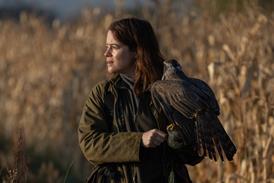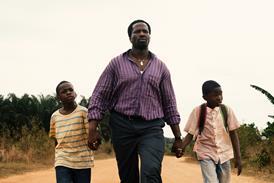Dir: Anne Fontaine.Fr-Bel. 2005. 90mins.
Frenchauteur and former actress Anne Fontaine has been turning out nuanced studies ofthe hidden depravities of respectable middle-class life for a decade. Thehighpoint was 2001's How I Killed My Father, which staged a riveting,deliciously ironic encounter between a son and a father, played respectively,and brilliantly, by Charles Berling and Michel Bouquet.
Unfortunately, this timeround, Fontaine has none of the plot, themes or acting firepower of herprevious efforts (which also include the excellent Dry Cleaning) andconsequently In His Hands falls flat on numerous counts.
It may do decent business inFrance, owing to the director's pedigree and to the great fuss being made aboutthe film's superficial resemblances to the work of French master ClaudeChabrol, but it will struggle to interest distributors elsewhere.
The story concerns whatstarts as a business relationship between Claire (Carre), an apparently happilymarried insurance claims adjuster, and Laurent (Poelvoorde), a vet whose clinichas sustained some water damage. Not content merely to accept a cheque, Laurentgradually insists his way into Claire's personal life.
At pregnant momentsthroughout the film, Claire hears reports on radio and television regarding aserial killer who's wreaking havoc on the female population of Lille, thenorthern French town where the film is set. Most of the rest of the plot swingsbetween the "is he" or "isn't he" poles of this familiar pendulum.
Fontaine has alwaysdemonstrated a feel for the petty but revealing details of everydaymiddle-class life, and that ability to stage a charged mise-en-scene remains ondisplay with In His Hands.
In choosing to portray acharacter who pushes his way into another character's life, the film is faintlyreminiscent of Domink Moll's Harry, Un Ami Qui Vous Veut Du Bien butmuch less accomplished and less believably threatening.
Numerous other problemshamper the full expression of Fontaine's talents. For one thing, if afilm-maker chooses to indulge in the massively over-used cliche of the serialkiller, then said film-maker had better bring something new to the genre. ButFontaine doesn't, ultimately contenting herself with the cheesiest ofpsychological explanations for the killer's actions.
In fact, the motivations fornone of the characters are properly handled. Fontaine spends way too littletime setting up a plausible basis for the domestic discontent that couldpossibly induce the gorgeous Claire to become interested in a boring andself-admittedly homely sad-sack like Laurent.
We see tiny glimpses of herlife with her professional photographer husband (Zaccai) and a recalcitrantyoung daughter (Louvieux), but they're never developed enough to motivateClaire's fateful choices. And aside from the minimal tension that comes fromClaire's dark suspicions about Laurent, there's little power generated from themodicum of sexual chemistry between the two leads. Their dialogue also remainsbanal, unlike Chabrol's, which usually manages to be banal yet fruitfullymenacing at the same time.
Toward the end, Claire seemsto begin to enjoy the very fact that her life is spinning out of control, andthe film starts to take on some interest. Alas, by this point, there's littletime left to examine this premise, and the film ends preposterously. It'sunfortunate when the highpoint of a film by Anne Fontaine comes when Claire'sdaughter plays with a couple of adorable lion cubs at the zoo where Laurentworks.
Production companies
Soudaine Compagnie
Cine B
K2/K-Star
Sofica EuropaCorp
Banque Populaire Images 5
CRRAV Nord-Pas de Calais
Nord-Pas de Calais Region
Walloon Region
International sales
Pathe Distribution
Producers
Bruno Pesery
Philippe Carcassonne
Screenplay
Anne Fontaine
Julien Boivent
from the novel by Dominique Barberis
Cinematography
Denis Lenoir
Editor
Philippe Ravoet
Luc Barnier
Production design
Sylvain Chauvelot
Music
Pascal Dusapin
Main cast
Benoit Poelvoorde
Isabelle Carre
Jonathan Zaccai
Valerie Donzelli
Agathe Louvieaux

















No comments yet